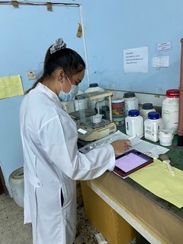Change Language: ภาษาไทย
Master level programs
Environmental science
หลักสูตรภาษาไทย ระบบทวิภาค
ระยะเวลา: 2 ปี
จำนวนรับเข้า: 10 คน
คุณสมบัติผู้สมัครเข้าศึกษา:
คุณสมบัติของผู้เข้าศึกษาต้องเป็นไปตามข้อบังคับมหาวิทยาลัยธรรมศาสตร์ว่าด้วยการศึกษาระดับบัณฑิตศึกษา พ.ศ. 2561 ข้อ 22 และมีคุณสมบัติ ดังนี้
แผน ก แบบ ก 1: เน้นการศึกษาวิจัย
(1) เป็นผู้สำเร็จการศึกษาวิทยาศาสตรบัณฑิต หรือวิศวกรรมศาสตรบัณฑิต
(2) ต้องมีค่าระดับเฉลี่ยสะสมตลอดหลักสูตร (GPA) ไม่ต่ำกว่า 2.75 หรือ มีประสบการณ์ในการทำงานที่เกี่ยวข้องกับสิ่งแวดล้อมมาแล้วไม่น้อยกว่า 5 ปีหลังสำเร็จการศึกษาระดับปริญญาตรี โดยมีหนังสือรับรองจากผู้บังคับบัญชา หรือหัวหน้าหน่วยงาน และ
(3) ต้องมีผลงานเชิงประจักษ์ทางด้านวิชาการในรูปแบบใดรูปแบบหนึ่งที่แสดงถึงศักยภาพในการวิจัยทางด้านวิทยาศาสตร์สิ่งแวดล้อมหรือสาขาวิชาที่เกี่ยวข้อง
แผน ก แบบ ก 2: เน้นการศึกษารายวิชาและการทำวิทยานิพนธ์
(1) เป็นผู้สำเร็จการศึกษาวิทยาศาสตรบัณฑิตหรือวิศวกรรมศาสตรบัณฑิต จากสถาบันที่สภามหาวิทยาลัยให้การรับรอง หรือ
(2) เป็นผู้สำเร็จการศึกษาระดับปริญญาตรีและมีประสบการณ์ในการทำงานที่เกี่ยวข้องกับสิ่งแวดล้อมมาแล้วไม่น้อยกว่า 2 ปีหลังสำเร็จการศึกษาระดับปริญญาตรี โดยมีหนังสือรับรองจากผู้บังคับบัญชา หรือหัวหน้าหน่วยงาน
จำนวนหน่วยกิต:
หลักสูตรปกติ 2 ปีการศึกษา (รวม 4 ภาคการศึกษา) โดยมีการจัดการเรียนการสอน 2 แผนการศึกษา ดังนี้
1. แผน ก แบบ ก 1 (ทำเฉพาะวิทยานิพนธ์):
(1) ศึกษารายวิชา (ไม่นับหน่วยกิต) 2 หน่วยกิต
(2) วิทยานิพนธ์ 36 หน่วยกิต
จำนวนหน่วยกิตรวม 36 หน่วยกิต
2. แผน ก แบบ ก 2 (ศึกษารายวิชาและทำวิทยานิพนธ์):
(1) หมวดวิชาบังคับ 9 หน่วยกิต
(2) หมวดวิชาเลือก 15 หน่วยกิต
(3) วิทยานิพนธ์ 12 หน่วยกิต
จำนวนหน่วยกิตรวม 36 หน่วยกิต
ค่าเล่าเรียนต่อภาคการศึกษา:
- 18,800 บาท / ภาคการศึกษา
สถานที่ศึกษา:
ติดต่อหลักสูตร:
E-mail: mscenvitu@yahoo.com
FB: https://www.facebook.com/envitu/ หรือ
https://www.facebook.com/tu.envi/
Website: https://envi.sci.tu.ac.th/master-degree
Program description
Sustainable development is made up of three major factors, namely, economic, social and environmental factors (this includes natural resources, which are the nations primary capital). However, it is clear that the country’s environment and natural resources are continuously deteriorating due to resource utilization without planning or consideration to the sustainability of resources and environments. Environmental science is broadly connected to various occupations and not only occupations directly resulting from bachelor-level graduation in an environmental field. Instead, they include other occupations such as agriculture, product development and even public administration. Therefore, a master-level education in environmental science is a means to strengthen knowledge and understanding about the environment, which, in addition to enabling direct occupational pursuits, also help adjust work attitudes in other environmentally-friendly work.
The Master of Science in Environmental Science of the Faculty of Science and Technology of Thammasat University is supervised by a teaching staff which possesses knowledge and expertise covering many environmental sciences and technologies. Learners will obtain essential knowledge in various sciences and have independence in creating their own study plans to be consistent with the thesis dissertation topics of their interest. Focus is also placed on building research skills based on the scientific method in order to develop and/or apply knowledge in academic developments which can respond to rapidly changing environment situations in the world.
Research Topics
The program is supervised by a teaching staff which meets the standard qualifications for graduate level programs and possesses expertise covering many environmental sciences and technologies. Learners will be able to choose their thesis advisory professors and create learning plans that are consistent with their interests.
Target Occupations After Graduation –
(1) Environmental academic/expert, environmental researcher/scientist.
(2) Teacher/instructor in environmental science or other related subjects.
(3) Civil servant or State Enterprise Employee
(4)) Entrepreneur or Business Employee
(5) Freelancer

